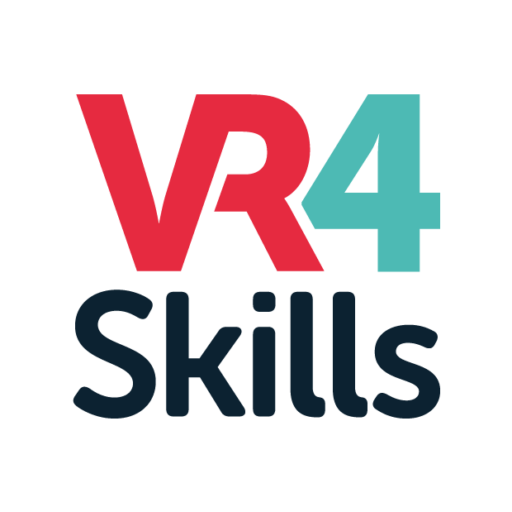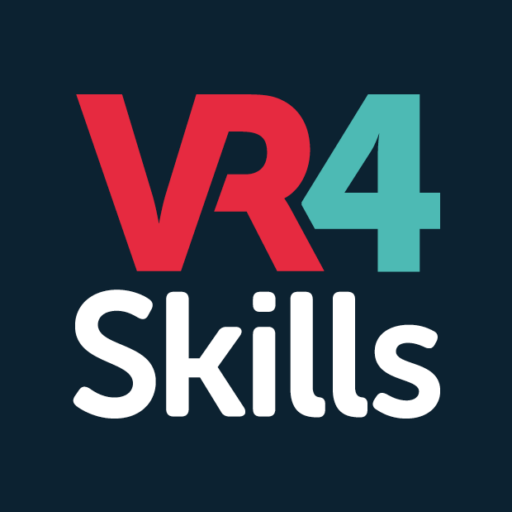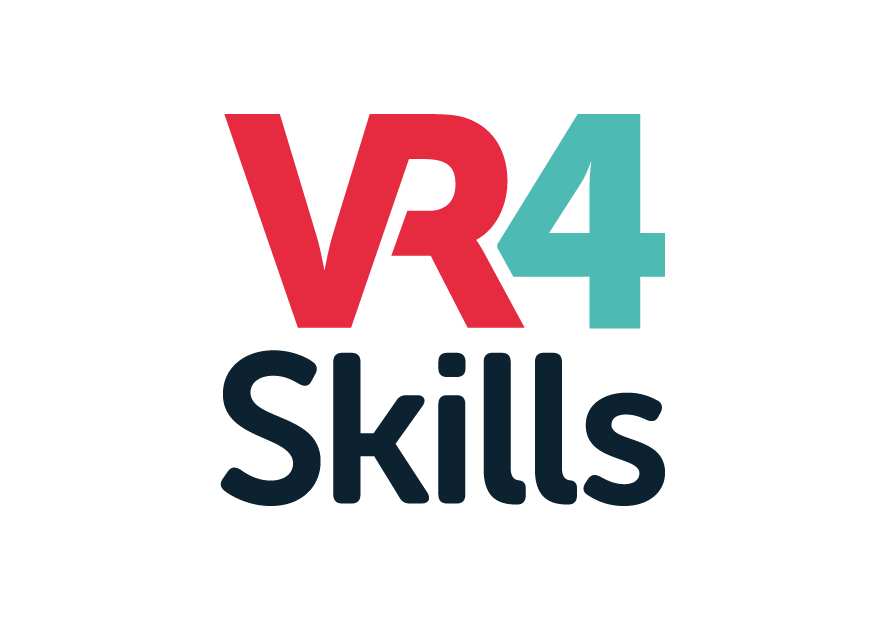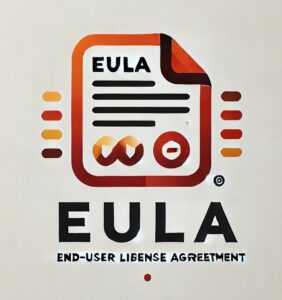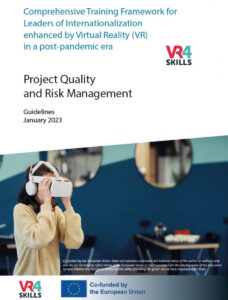The VR4Skills project, co-funded by the European Union under the Erasmus+ program, has developed several key deliverables aimed at enhancing education and training for non-academic staff of HEI’s. These deliverables are openly accessible and free to use, promoting widespread adoption and integration. Co-funded by the European Union. Views and opinions expressed are however those of the author or authors only and do not necessarily reflect those of the European Union or the Foundation for the Development of the Education System. Neither the European Union nor the entity providing the grant can be held responsible for them.
Co-funded by the European Union. Views and opinions expressed are however those of the author or authors only and do not necessarily reflect those of the European Union or the Foundation for the Development of the Education System. Neither the European Union nor the entity providing the grant can be held responsible for them.
Discover VR4Skills Deliverables
Below, you’ll find detailed descriptions of the deliverables created under the VR4Skills project. Each resource is available for free download directly from our website. Explore and benefit from these innovative tools designed to enhance education and training!
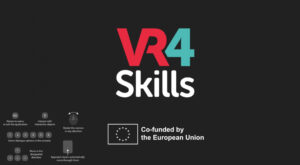
Key Features of the VR4Skills Application:
- Immersive Scenarios: Leveraging advanced 3D and cinematic VR technologies, users can engage with real-world challenges through dynamic, non-linear scenarios. These experiences replicate complex decision-making environments to foster critical thinking and adaptability.
- Tailored Learning: The application supports various learning paths with adjustable difficulty levels, ensuring accessibility for both novice and experienced users. This adaptability enhances individual and group training experiences.
- State-of-the-Art Technology: Built on Unreal Engine 5.4, the application integrates cutting-edge VR capabilities, offering seamless performance with Meta Quest 2 VR headsets. The use of sound, visual cues, and interactive elements creates a truly immersive training environment.
Free Access and Licensing
To promote inclusivity and innovation, the VR4Skills Application offers a multi-user, unlimited-duration license, allowing broad access for training institutions worldwide.
VR4Skills Application user guide:
- Read before installing
- Learn about Licence
- Learn about Hardward Requirements
- Get install instructions.
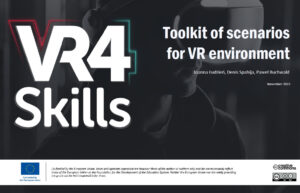
Toolkit of Scenarios for VR environment offers an array of customizable, VR-driven training scenarios. These scenarios focus on real-world challenges in intercultural effectiveness, leadership, and digital skills, such as:
- Supporting international students in cultural adaptation.
- Navigating complex group dynamics and enhancing cross-cultural teamwork.
- Managing technical tasks like network troubleshooting and resource configuration in virtual office environments.
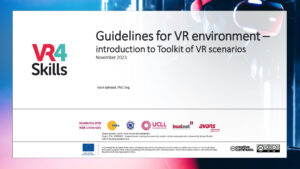
Guidelines for VR Environment provide a detailed roadmap for utilizing VR in education and professional training. They emphasize:
- The benefits of immersive VR in scenarios where real-world training is impractical, dangerous, or resource-intensive.
- Enhanced engagement, knowledge retention, and affordability through realistic, interactive simulations.
- Practical applications ranging from leadership training to empathy-building and technical skill acquisition, underpinned by data-driven insights such as eye-tracking and biometric analysis.
The document outlines comprehensive guidelines for designing and implementing Virtual Reality (VR) learning environments tailored to educational and training purposes. It emphasizes creating immersive scenarios using VR technologies to enhance problem-solving skills, simulate real-world challenges, and provide engaging, interactive learning experiences.
Key aspects of the document include principles for scenario creation at different immersion levels (360-degree photos/videos and static or dynamic 3D models). It elaborates on the importance of defining clear objectives, understanding the target audience, leveraging realism, and ensuring intuitive interaction mechanisms. Additionally, it stresses iterative design, emphasizing modularity, error management, accessibility, and adaptability to accommodate varying user expertise.
The document also provides step-by-step guidance on VR scenario development, covering elements like environment creation, character integration, difficulty level design, feedback mechanisms, and data collection for evaluation and improvement. Practical scenarios such as emergency drills, safety training, and decision-making exercises are illustrated, highlighting dynamic paths based on user choices. This resource serves as a foundation for integrating VR into diverse educational contexts, bridging theory and practice while prioritizing user engagement and learning outcomes.
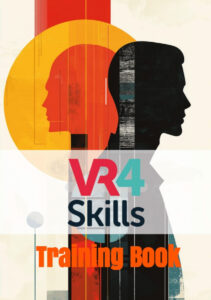
VR4Skills Training Book is a comprehensive educational guide aimed at equipping non-academic university personnel with skills to thrive in an increasingly digital and intercultural work environment.
The training book is organized into key thematic modules:
- Collaboration and Mental/Cognitive Skills: This module emphasizes developing emotional and social intelligence, resilience, and cognitive abilities for effective teamwork and stress management.
- Digital Skills: Focused on mastering digital tools for communication, content creation, and collaboration, this section trains participants in software like Microsoft Teams and OneDrive, fostering efficient digital workflows.
- Management and Leadership Skills: This module explores foundational management principles and leadership styles, offering strategies for leading teams effectively and adapting to varying organizational dynamics.
- Intercultural Effectiveness: Designed to develop empathy and intercultural competence, this module prepares participants to navigate diverse work environments successfully.
Are you ready to take your career to the next level? The VR4Skills Training Book is your ultimate guide to mastering essential workplace skills in today’s fast-paced, digital world. This free, comprehensive resource is packed with insights, practical exercises, and innovative tools that bring learning to life.
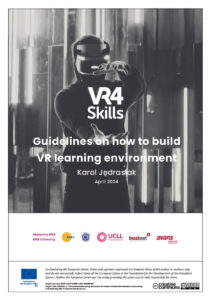
The comprehensive “Guidelines on How to Build VR Learning Environment”. This document outlines a robust framework for designing and implementing Virtual Reality (VR) educational tools tailored for immersive training experiences.
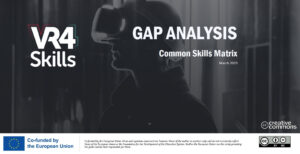
The Gap Analysis for the VR4Skills project focuses on identifying and addressing skill gaps in administrative and academic leaders, particularly in the context of internationalization and the post-pandemic era. This project emphasizes the integration of Virtual Reality (VR) for enhancing training programs aimed at building specific competencies.
Key Focus Areas of Skills
The gap analysis assessed four primary skill areas:
- Digital SkillsCompetency in digital tools and environments (e.g., data literacy, problem-solving, content creation).
- Management and Leadership SkillsAbilities related to effective management, decision-making, and people development.
- Intercultural Communication and Collaboration SkillsSkills for working effectively across diverse cultures and fostering collaboration.
- Mental and Cognitive SkillsMindfulness, adaptability, and the ability to stay focused under challenging conditions.
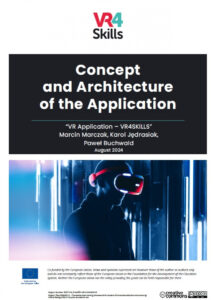
The document outlines the concept and architecture of VR4SKILLS Application. The application is designed to provide immersive training for leaders of internationalization in the post-pandemic era, leveraging VR technology to simulate realistic scenarios for educational purposes.
The content includes detailed functional requirements, such as the application’s reliance on VR goggles and a 3D environment, its educational focus on scenario-based training, and its interactive design without reliance on traditional 2D interfaces. The application incorporates multiple language support, high-contrast modes, and scenario-specific decision trees to facilitate user engagement and learning.
The document also specifies technical and usability standards, including the use of Unreal Engine 5.4 and compatibility with Meta Quest 2. The architecture features both a VR and web-based interface, each catering to different user needs and contexts. It mandates robust testing for performance, stability, accessibility, and user experience, ensuring the application meets high standards for functionality and immersion.
Key scenarios presented in the document simulate challenges such as cultural adaptability, team management, and leadership, providing users with options and consequences to hone decision-making skills in a controlled environment. The document also outlines testing protocols and long-term support, including open-ended licensing and a commitment to updates for two years post-acceptance.
